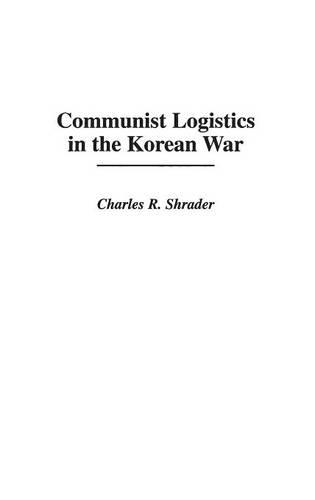
Communist Logistics in the Korean War
(Hardback)
Publishing Details
Communist Logistics in the Korean War
By (Author) Charles R. Shrader
Bloomsbury Publishing PLC
Praeger Publishers Inc
20th November 1995
United States
Classifications
Tertiary Education
Non Fiction
Asian history
War and defence operations
Far-left political ideologies and movements
951.9042
Physical Properties
Hardback
312
Width 156mm, Height 235mm
539g
Description
This book describes the logistical systems and requirements of the North Korean People's Army and Chinese Communist forces during the Korean War. The author examines the performance of the Communist logistical system from June 1950 to July 1953, explaining the failure of the United Nations air interdiction campaign in terms of the constant improvement of Communist logistical capabilities. The author concludes that the United Nations air force damaged, but was unable to destroy, the Communist distribution system. The North Koreans and Chinese Communists were able to supply their front line units sufficiently to enable them to conduct a strong static defense, which prevented a United Nations victory, and in the last months of the war, to mount strong, sustained offensive actions.
Reviews
.,."The question addressed in this superb study, Communist Logistics In The Korean War, shows how the North Korean and Chinese Communists were able to sustain their forces in the field for three years against the relatively well-equipped and technologically sophisticated forces of the United Nations Command."-Bravo/Veterans Outlook Magazine
...The question addressed in this superb study, Communist Logistics In The Korean War, shows how the North Korean and Chinese Communists were able to sustain their forces in the field for three years against the relatively well-equipped and technologically sophisticated forces of the United Nations Command.-Bravo/Veterans Outlook Magazine
..."The question addressed in this superb study, Communist Logistics In The Korean War, shows how the North Korean and Chinese Communists were able to sustain their forces in the field for three years against the relatively well-equipped and technologically sophisticated forces of the United Nations Command."-Bravo/Veterans Outlook Magazine
Author Bio
CHARLES R. SHRADER, an independent historian and consultant lives, in Carlisle, Pennsylvania. A Vietnam veteran, he retired from the United States Army in 1987 as a lieutenant colonel. He is the author of Amicicide: The Problem of Friendly Fire in Modern War (1982) and U.S. Military Logistics, 1603-1991: A Research Guide (Greenwood, 1992). The general editor of the five volume Reference Guide to United States Military History, he currently serves as the executive director of the Society for Military History.
